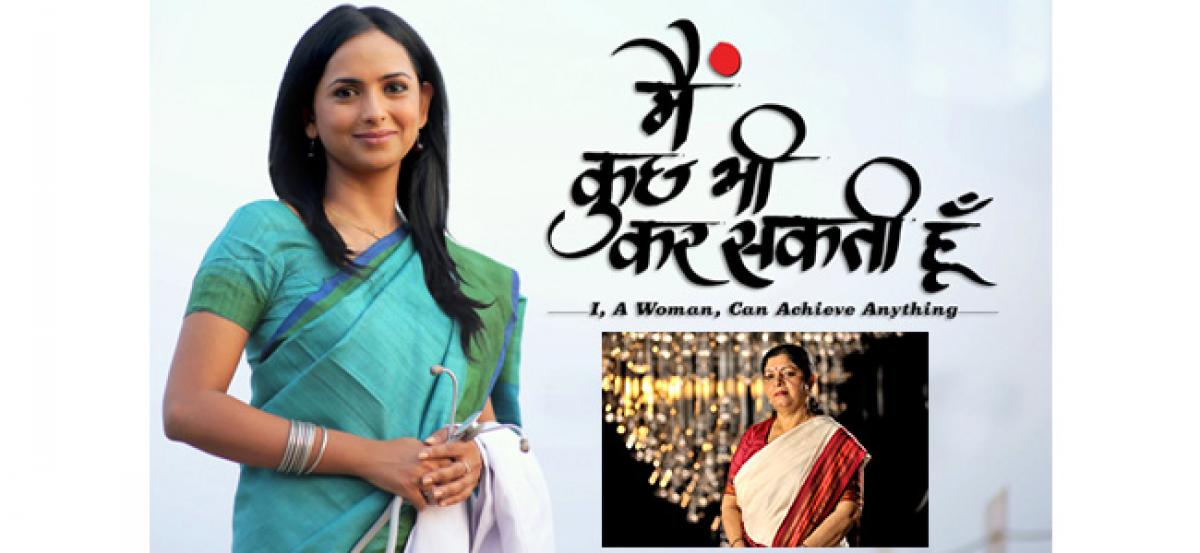Live
- Five-Year-Old Boy Dies After 55-Hour Rescue from Borewell in Rajasthan's Dausa
- Chaos in Parliament over Congress-George Soros link claims, BJP MP poses questions
- Bus Driver Arrested After Deadly Accident in Mumbai’s Kurla; 42 Injured
- Rs 36.07 crore tribal products sold through TRIFED in FY24: Govt
- PM Modi to lay foundation stone for Ken-Betwa river linking project on Dec 25: MP CM
- 70 farmers trained as drone pilots in Anantapur dist
- AP Pensions: 500 Ineligible People Receive Pensions for Every 10,000
- South Korea's ruling party chief voices support for President Yoon's impeachment
- Defeat in Tirhut bypolls doesn't signify discontent among teachers: Bihar Education Minister
- Over 1 lakh micro food processing enterprises get assistance under PMFME scheme: Minister
Just In

Riding on its success in reaching out to more than 400 million viewers, the two-season-old Indian show \"Main Kuch Bhi Kar Sakti Hoon\" (\"I, a woman, can achieve anything\" or MKBKSH), which challenges patriarchal attitudes and gender discrimination, is set to bring stories from the field onto digital media through a web series.
Riding on its success in reaching out to more than 400 million viewers, the two-season-old Indian show "Main Kuch Bhi Kar Sakti Hoon" ("I, a woman, can achieve anything" or MKBKSH), which challenges patriarchal attitudes and gender discrimination, is set to bring stories from the field onto digital media through a web series.
Challenging regressive social and cultural norms around family planning, early marriage, domestic violence and sex selection, Population Foundation of India's MKBKSH, went on air on India's public broadcaster Doordarshan in 2014.
This February, it set a new record for edutainment shows by attaining a cumulative reach of 400 million and "still counting", based on its telecast of 131 episodes across both the seasons, its repeat telecast (based on popular demand) initiated in December 2016, the telecasts on the 16 regional DD channels and broadcasts on All India Radio FM stations. It has been translated into 13 languages.
The show revolves around Sneha Mathur, a young doctor, who leaves behind her lucrative career in Mumbai and decides to work in her village. The show also focuses on Sneha's crusade to ensure the finest quality of healthcare for all. Under her leadership, village women find their voice through collective action.
"We plan to develop and disseminate edutainment content from MKBKSH on digital media platforms as well as increase online viewership through Vimeo and YouTube. For example, we are making the leap from reel to real films by bringing stories from the field onto digital media," the organisation's executive director Poonam Muttreja, told.
"The team at PFI has shortlisted ten stories collected from the MKBKSH field interventions in the states of Madhya Pradesh and Bihar, where the intervention was more in-depth, either through direct outreach programmes or through calls received on the Interactive Voice Response System (IVRS)," she informed.
The field activities are accompanied by the 'Real Hero' awards which promote community participation, commending and felicitating people, who motivated by the series and outreach have done exemplary work towards adopting and promoting practices on family planning, said Muttreja.
As an example of the digital outreach initiatives, Muttreja cited a true story for the web series, christened "The Feisty Ladkuwar Khushwaha", which highlights the journey of 21-year-old Ladkuwar Khushwaha, the first girl from her village in Madhya Pradesh to go to college.
"Of the ten stories, the five most impactful were filmed with Sneha. These films are based on inspiring role models, both male and female, who are leading change or have challenged social norms in their respective communities. Advocating the issues showcased in the MKBKSH series, the films are currently being packaged and the dissemination plan finalised," she said.
Season one focused on key behaviour and social norms around child marriage, sex selection, domestic violence, sensitisation of boys and reproductive health and family planning. The second season addressed issues of mental health, substance misuse, physical and sexual changes, sanitation and hygiene, physical and sexual violence and gender-based discrimination, with a special focus on young people.
Muttreja said: "With regard to season three, we are currently engaged in a consultative process with a range of experts, civil society organisations and stakeholders to prioritise the issues that need attention.
"Reaching out more to the youth will certainly be our focus as they will form the demographic bulge - educating them on issues related to sexual and reproductive health and rights (SRHR), gender equality, ending violence against women and mental health is an investment that we cannot afford not to make.
"They need to be empowered with the awareness about their rights and gender equality, about access to contraceptive choices, and the right to make informed choices. These will stand them in good stead in the long-run, contributing to the overall socio-economic development of the country.
"We would also like to continue our partnership with Doordarshan and All India Radio as well as explore partnerships with private channels to telecast MKBKSH, as the issues are as relevant today as they were when the programme was launched."

© 2024 Hyderabad Media House Limited/The Hans India. All rights reserved. Powered by hocalwire.com







